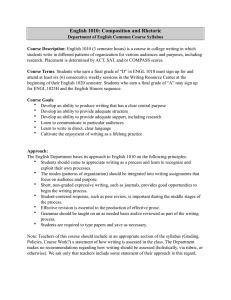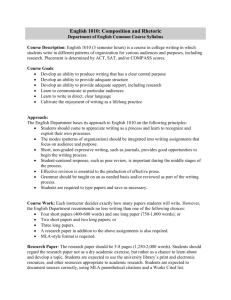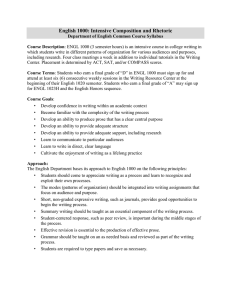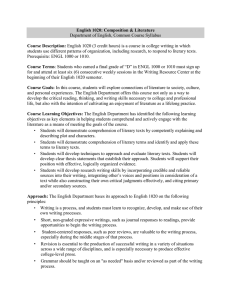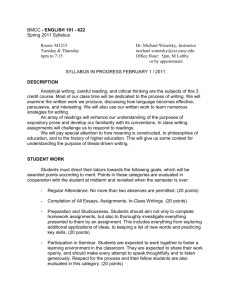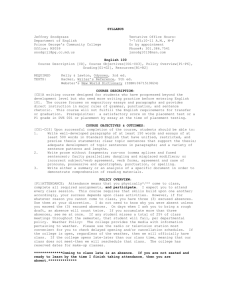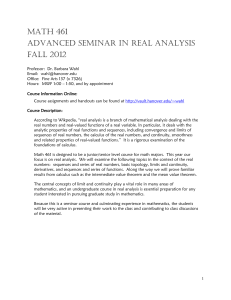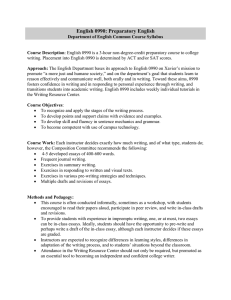MS Word - Xavier University of Louisiana
advertisement
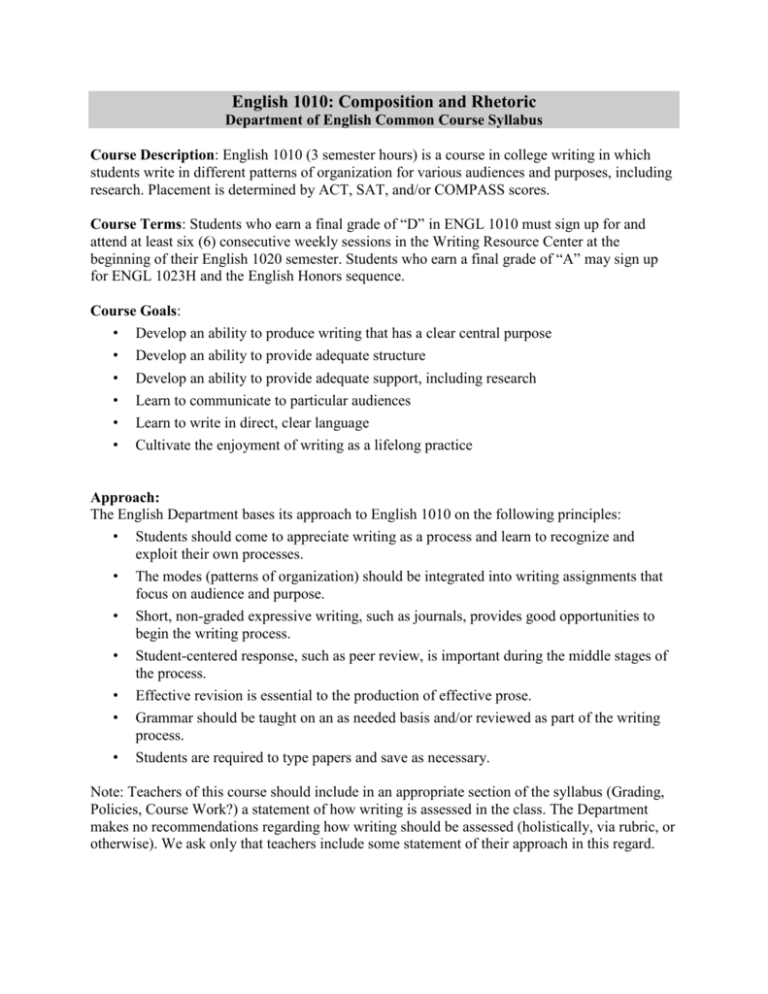
English 1010: Composition and Rhetoric Department of English Common Course Syllabus Course Description: English 1010 (3 semester hours) is a course in college writing in which students write in different patterns of organization for various audiences and purposes, including research. Placement is determined by ACT, SAT, and/or COMPASS scores. Course Terms: Students who earn a final grade of “D” in ENGL 1010 must sign up for and attend at least six (6) consecutive weekly sessions in the Writing Resource Center at the beginning of their English 1020 semester. Students who earn a final grade of “A” may sign up for ENGL 1023H and the English Honors sequence. Course Goals: • Develop an ability to produce writing that has a clear central purpose • Develop an ability to provide adequate structure • Develop an ability to provide adequate support, including research • Learn to communicate to particular audiences • Learn to write in direct, clear language • Cultivate the enjoyment of writing as a lifelong practice Approach: The English Department bases its approach to English 1010 on the following principles: • Students should come to appreciate writing as a process and learn to recognize and exploit their own processes. • The modes (patterns of organization) should be integrated into writing assignments that focus on audience and purpose. • Short, non-graded expressive writing, such as journals, provides good opportunities to begin the writing process. • Student-centered response, such as peer review, is important during the middle stages of the process. • Effective revision is essential to the production of effective prose. • Grammar should be taught on an as needed basis and/or reviewed as part of the writing process. • Students are required to type papers and save as necessary. Note: Teachers of this course should include in an appropriate section of the syllabus (Grading, Policies, Course Work?) a statement of how writing is assessed in the class. The Department makes no recommendations regarding how writing should be assessed (holistically, via rubric, or otherwise). We ask only that teachers include some statement of their approach in this regard. Course Work: Each instructor decides exactly how many papers students will write. However, the English Department recommends no less writing than one of the following choices: • Four short papers (400-600 words) and one long paper (750-1,000 words); or • Two short papers and two long papers; or • Three long papers. • A research paper in addition to the above assignments is also required. • MLA-style format is required. Research Paper: The research paper should be 5-8 pages (1,250-2,000 words). Students should regard the research paper not as a dry academic exercise, but rather as a chance to learn about and develop a topic. Students are expected to use the university library’s print and electronic resources, and other resources appropriate to academic research. Students are expected to document sources correctly, using MLA parenthetical citations and a Works Cited list. Class Work: To provide students with experience in impromptu writing, one or at most, two essays could be in-class essays. Ideally, students can have the opportunity to pre-write in preparation for the in-class essay. Each instructor will decide if these essays will be graded. This course is often conducted informally, sometimes as a workshop, with students expected to read their papers aloud, participate in peer review, and write in-class drafts and revisions. Class Attendance: The university attendance requirement is strictly followed. Whether the absences are “excused” or “unexcused,” more than six absences if the class meets three times a week, or four absences if the class meets twice a week will result in the grade of “FE” (failure due to excessive absences). Writing Resource Center: Instructors may recommend or require that students attend the Writing Resource Center for one or more sessions of individual tutoring. Cheating/Plagiarism: Passing off another person’s work as one’s own constitutes plagiarism, a flagrant violation of the intellectual honesty expected of all students. Any assignment that gives evidence of not being completely one’s own work will receive a grade of F or zero. Egregious plagiarism or additional evidence of plagiarism after the first incident may result in a grade of F for the course and possible administrative action. ACADEMIC INTEGRITY Students should become thoroughly acquainted with the following documents: Xavier University's Plagiarism Policy & The English Department’s Plagiarism Statement http://www.xula.edu/english/documents/plag.doc
